












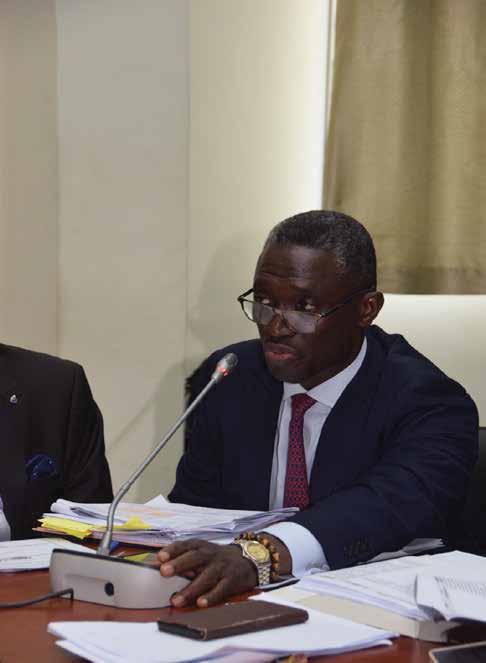 By Eugene Davis
By Eugene Davis
The Social Security and National Insurance Trust (SSNIT) says it has exited from some of its investments and begun processes to attract strategic investors to take up stakes in some of its non-performing portfolios to ensure value for money is achieved.
Appearing before the Public Accounts Committee (PAC) sitting in Accra last week, to give further details on the status of some 15 nonperforming agencies, the Deputy Director-General, Investment and Development, Mr. Ko Bosompem Osafo-Maafo, said the trust have taken inventory of all these assets and have sold o some of its stakes and is also courting strategic investors to leverage on some of the viable assets.
Mr. Osafo-Maafo explained the various status of the portfolios, stating that for CDH - The company’s performance has not improved and SSNIT has o ered its equity stake in the company for sale since 2014.
In the case of Metro Mass Transit Ltd (MMT), SSNIT management stated that they have received the company’s audited accounts for the period 2016 to 2020 and will continue to monitor the company to ensure shareholder value is preserved.
It said the Trust entered into this investment as part of its corporate social responsibility at the onset and has, thus, classi ed it as an Economically Targeted Investment (ETI) in its asset’s classi cation.

It added that MMT has not been able to make pro t because it was set up to provide a ordable, safe and reliable inter and intra city transport services targeted at the lower income class of workers.
“It has contributed to job creation, improved livelihood and helped expand contributor base of the Trust. It continues to play a crucial role in aiding accessibility to jobs, shops, schools and healthcare,” SSNIT said.
Due to its focus, it hardly increases its fares despite consistent increases in its cost of operation. The initial investment value in this Company is GH¢633,753.
With regard to Accra Abattoir Company Limited (AACL), which was initially, categorized as an Economically Targeted Investment (ETI). Management of SSNIT said AACL has not been able to break-even as expected and its market share keeps reducing as new and more modern abattoirs spring up. SSNIT is still working to exit the company.
Management has engaged the State Interest and Governance Authority (SIGA) on the way forward. An interested investor is undertaking due diligence on the company.
FOS Aluminium (FOS) - SSNIT has reduced its exposure to FOS. It has swapped its debt of US$1,301,000 plus interest with land owned by the company. Therefore, as at 31st December, 2018, SSNIT no longer has any debt facility with FOS.
Kumasi Abattoir (KACL) -SSNIT is working on an exit strategy to sell its stake to or bring in a strategic investor. The prospective strategic investor is undertaking due diligence. A Resolution was passed at the last AGM for the Abattoir to sell some of its land to repay the debt it owed the Trust. The sale of the land will not a ect the commer cial operations of the company and is expected to signi cantly improve the nances of the company.
Trust Sports Emporium Limited (TSEL) - Discussion on proposed swap has commenced with the Ministry of Youth and Sports (MOYS). A joint technical committee with members from both SSNIT and the Ministry has been formed.
NTHC Limited - There have been several discussions and meetings on NTHC Limited, which culminated in the conversion of a part of the debt owed to SSNIT into equity and preference shares. The conversion has enabled NTHC to prepare its Financial Statements for presentation to SEC as part of its restructuring strategy and meeting its regulatory requirements.
NTHC is in discussions with SEC on the way forward.

Intercity STC Ltd (ISTC) – The External Auditors of the company have recently completed the audits of 2013 to 2020 nancial statements. The audited accounts for the period 2013 to 2020 have been signed by the ISTC Board and approved by Shareholders at an Annual General Meeting held in November 2022.
The company secured a facility from Agriculture Development Bank to acquire 100 new buses and has built a new Driver and Vehicle Licensing Authority (DVLA) Centre with four terminals at the ISTC yard through a public private partnership and which has started operating. These measures would help position the Company to successfully turnaround to perform pro tably.
Trust Logistics Ltd (TLL) - SSNIT is monitoring the implementation of the turnaround strategy that has been developed with the company to improve its performance.
commenced operations within the year under review. It was the expectation that business would steadily grow and gradually improve over time. COVID-19 however disrupted this growth pattern.
Golden Beach Hotels – SSNIT started a process to bring in private strategic investors with the aim of turning the hotels round to pro tability. As part of the process, a Transaction Advisor was engaged. The Transaction Advisor has conducted all due diligence, prepared estimates of needed improvements, prepared the Information Memorandum (IM) for the sourcing of the Strategic Partners (SPs), and prepared a Request for Proposal (RFP) as part of the sourcing process. An international Expression of Interest was published, and receipted interests were evaluated, and a shortlist of prospective SPs has been prepared. The RFP and IM have been issued to the shortlisted rms, Data Room created and opened to them for their access to relevant information to aid in their preparation of proposals. Proposals have been submitted and the Technical Proposals opened. Evaluation of the Technical Proposals are ongoing.
Ghana Industrial & Commercial Estates Limited (GICEL) – The court ruled in SSNIT/GICEL’s favour but Ghana National Association of Garages (GNAG) is dissatis ed with the ruling and has led an appeal at the Courts of Appeal.
Though the company has been making periodic payments, the Trust is still pursuing it to fully recover the outstanding debt. The company has so far paid a total of GH¢233,756 to the Trust under the facility. The Trust is providing legal assistance to the company on GNAG's litigation. The Trust contin-
ues to engage the company for the settlement of its indebtedness.
Grand Regency Hotel (Kumasi Catering Rest House) – SSNIT has sold its stake in the company.
RSS Developers Limited (RSS) – The rst phase of the asset-liability swap has been agreed and is being nalized, based on an independent valuation of the completed properties of the company. The Trust has initiated the legal process for the execution of the swap arrangement. A second phase of the swap, which includes the uncompleted proper-
ties of RSS and vacant lands is underway.
On completion of the swap, SSNIT will rent out and sell these properties to recover its investments.
Switchback Developers Limited (SDL) – The Adinkra Heights project has been completed (November, 2022). The company has sold 36 of its 77 apartments. In view of other developments, SSNIT is taking over the company’s remaining 41 apartments and unutilised land. SSNIT has approved a budget for the company to facilitate the marketing and sale of the apartments, pending
completion of the documentation covering the transaction.
With respect to Trust F-line Properties Limited (TFPL) – 24 ats have been taken over by SSNIT and another 32 ats are pending delivery to SSNIT. In all, a total of 56 ats would be delivered to SSNIT.
The chairman of the Public Accounts Committee(PAC), James Klutse Avedzi urged management to analyse these companies and retrieve monies from those that it can, and “ where if you can sell your shares and realise your money, it
better than the money locked up there – no return is coming, it does not look good.”
The Minister of Employment and Labour Relations, Ignatius Ba our Awuah, who is also responsible for pensions said they would “do whatever possible to retrieve the residual, which are receivable and if possible, go ahead to liquidate, so they have clean books, these issues have been in the books dating back as late as 1993, -legacy issues which has to have a nality.”
The Ministry of Food and Agriculture (MoFA) has denied media reports that it has signed an agreement with a third party for the importation of large quantities of pork from the United States.
In a release, the Ministry noted that it’s Veterinary Services Directorate (VSD) requested from veterinary medical o cers in the USA for certi cation for meat and poultry healthiness intended to be exported to Ghana.

“MoFA categorically denies the
validity of the allegation as it has not signed any such agreement with any party.
“For clarity, the Veterinary Services Directorate (VSD) of MoFA has on record, a request from Dr. Charmaine McJee, Veterinary Medical O cer, Export Development of FSISUSDA, Washington for Certi cation for Meat and Poultry Wholesomeness intended to be exported to Ghana which was granted following laboratory analysis of samples”, the statement said. The statement added that it is an
obligation of VSD to render the requested services professionally in accordance with ethics of the Organization of World Animal Health for which Ghana is a Member. “Rather unfortunately, the VSD legal mandate has been misconstrued. We therefore take this opportunity to assure the general public that, no agreement has been signed between the Ministry and any party for the unbridled importation of pork to ood the Ghanaian market”.
Ghana Investment Fund for Electronic Communications (GIFEC), an Implementing Agency of the Ministry of Communications and Digitalisation responsible for programmes to close the Digital Divide, has been commended for its strong operational and nancial position by a member of the Public Accounts Committee (PAC) of Parliament, Isaac Yaw Opoku, Member of Parliament for O nso South Constituency, who led the review of GIFEC's statement of operations and nancial position by the PAC.
He observed that GIFEC posted an impressive 7.2% increase in surplus of income over expenditure, compared to the previous year, signi cantly improving its liquidity, as a result.
He concluded that GIFEC's “ nancial position is very good. Non-current assets increased by 14.5%, current assets by 20.1%. Their liquidity position is very strong and (has) even improved over the previous year. In fact, they did well and need to be commended.”
On progress of the Ghana Rural
Telephony and Digital Inclusion Project (GRT&DIP), GIFEC’s agship project, Mr. Prince Ofosu Sefah, Administrator (CEO) of GIFEC commented about its unprecedented nature, as begun in late 2020.
He mentioned that 473 out of the 1,008 (50% of the planned 2,016 Rural Mobile Sites being deployed by the Project) have completed and are active and delivering voice and data services to citizens.
He assured the Committee that plans are far advanced and e orts are being expedited to resolve all technical di culties being encountered, to ensure that the remaining Sites are all built and activated this year.
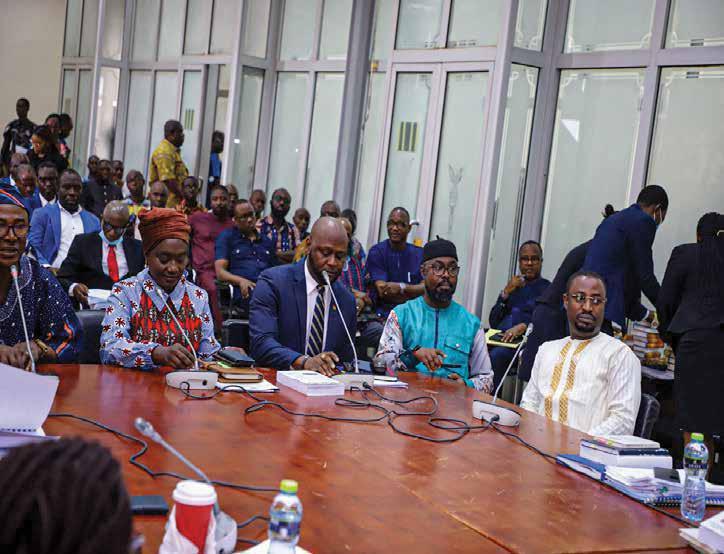
He concluded that equipment for the construction of the remaining 50% of the 2,016 Sites are actually in the country, awaiting funding for deploy ment, which is expected in the near-future.
The GRT&DIP forms part of GIFEC’s agship Rural Telephony Programme, which is funded by the Government of Ghana (GoG), through a strategic agreement with Huawei and China National Technical Import & Export Corporation (CNTIC),
GIFEC supervises the implementation of this Project, working with Technical Partners, on behalf of the
who also chairs the Board of Trustees of GIFEC, positions she has held since 2017.
The CEOs and Board Chairs of Specied Entities are currently convening at Kwahu-Nkwatia in the Eastern Region for the 2023 Annual Stakeholder Engagement.
Enroute their destination, leaders of Speci ed Entities were pictured seated in STC buses which conveyed them from Accra. These leaders seem to be making a deliberate attempt to reduce government spending with this action.
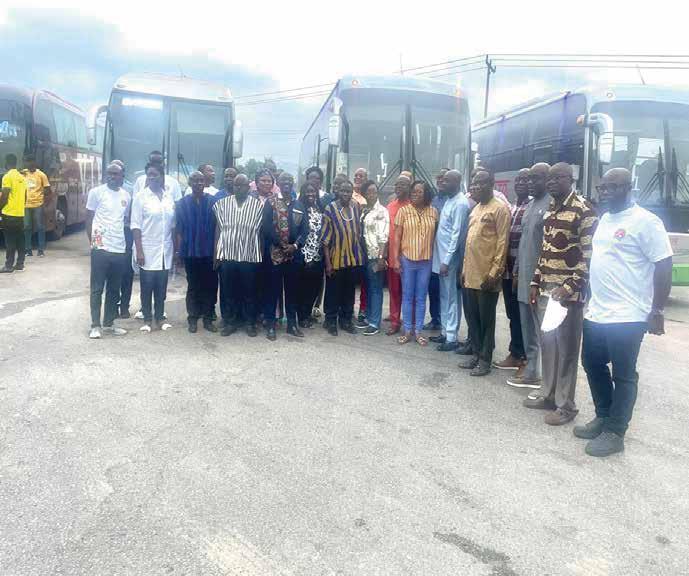
Co-ordinated by the State Interests and Governance Authority (SIGA) led by Ambassador Edward Boateng, the Annual Stakeholder Engagement will bring together Board Chairs, CEOs of Speci ed Entities, and other relevant stakeholders in accordance with Section 30 of the SIGA Act 2019 (Act 990).
Themed: “A Time to Re ect and
Rebuild”, the 2-day conference and stakeholder engagement will see participants discuss strategic initia tives aimed at transforming the Spec i ed Entities into high-performing organizations and ensuring they meet the President's vision of contributing 30% to Ghana's GDP.
Other industry captains and leaders of private sector organizations have been billed to participate in the sessions in an e ort to promote collaboration and build WIN - WIN partnerships between the public and private sectors for a sustainable Ghana.
President Nana Addo Dankwa Akufo-Addo will be present as the Guest of Honour and is set to deliver the keynote address on “Jumpstart ing the Economy” on the second day of the forum.
Parliament is considering a legislation or legal framework to address tax exemptions regime regarding the One District One Factory(1D1F) policy aimed at shoring up local revenue.
Parliament passed the Tax Exemptions Bill, 2022 last year to provide for a tax exemption regime in the country.
The current law did not make adequate provisions that addresses the exemptions regime in relation to the 1D1F framework.
Government introduced the 1D1F with the objective of boosting industrailisation with varied tax incentives but stakeholders have raised concerns about the excessive exemptions relating the 1D1F framework, which has caused the country several millions in tax reliefs.
Civil society and other pressure groups have raised concerns regards these tax holidays, hence the need for a review of the regime.
The bill, which would set clear eligibility criteria for tax exemptions, would also provide for the monitoring, evaluation and enforcement of exemptions.
Further, the bill would explore delivering a regulatory regime for monitoring tax exemptions to ensure that exemptions granted were used for the intended purposes, as well as control the abuse of the existing exemption regime.
Address the Parliamentary Press

Corps in Accra on Wednesday, the Minority Leader, Dr. Ato Forson said parliament has done a lot of work on the tax waivers, pointing out that the exemptions are becom ing too much, particularly times like this that the country needs every cedi to save the economy.
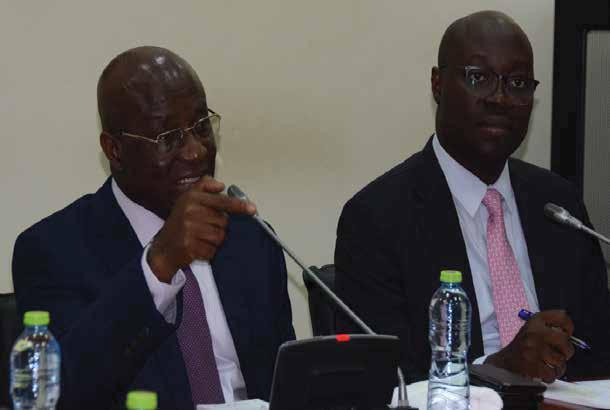
According to him, the country cannot continue granting tax exemptions and added that the nance committee has been very adamant in approving tax exemp tions, disclosing that parliament worked with the ministry to get the tax exemptions bill passed which culminated in the tax exemptions regime in for the rst time.
“In terms of the savings that the nance committee has led parlia ment to save in terms of tax exemp tions, if you quantify it, you will notice we have made huge progress as a country in terms of tax exemptions. There is still lot more we have to do, there is one we working on that has to do with 1D1F tax exemptions.
We believe that time has come for us to put brakes on tax exemptions and raise in enough revenue to support the scal and the country because we need every revenue to move the country forward, so put it in perspective you will notice the country has made more progress on the tax exemption than before.
I believe in continuous improvement, so we have to continuously identify the gaps we have in the tax exemptions regime and improve it going forward,” he added.
By Eugene DavisThe Majority Leader, Osei-Kyei-Mensah-Bonsu, also agreed with Dr. Ato Forson’s view, explaining “It is the reason we have introduced the Tax Exemptions Act, so from now on it is going to be the guiding principle.
It was projected that the exemptions for the 2022 nancial year lowered by about GH¢500m with the passage of the bill.
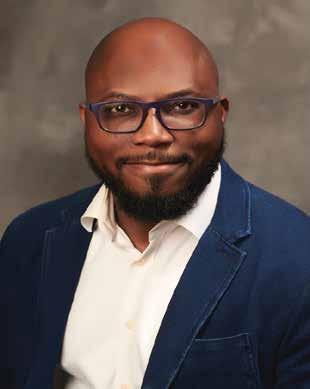
Olaseni Alabede, a veteran of the payments technology sector with more than 18 years of experience, has joined Global Technology Partners (GTP), an MFS Africa company, as chief technology o cer (CTO).
Acquired by MFS Africa in June 2022, the US-based GTP is the largest processor of prepaid cards in Africa, with more than 80 banks –including UBA, Ecobank, BIA, Stanbic, Coris, NSIA and Zenith Bank –using its platform.
Prior to joining the GTP executive team, Alabede was the Vice President of Product Development in MasterCard’s Installments business. In this New York-based role, he was responsible for the design and development of Buy-Now-Pay-later products on the Mastercard network. His history in the payments sector, however, dates back to the beginning of his career in 2003, when he started working as a web designer at the now-defunct City Express Bank in Nigeria. After that, he spent nearly a decade at Interswitch, growing from a project engineer to head of
enterprise service management.
“We are thrilled to have Olaseni come on board as the new CTO for GTP,” says GTP CEO, Christian Bwakira. “His extensive experience in both the African and international payments spaces and his clear passion for technology’s ability to improve people’s lives and help build better futures makes him the ideal person to drive us forward technologically.”
For his part, Alabede says that he is looking forward to taking charge not just of GTP’s technology stack, but the entire technology initiative behind the company and drive a strategy that enhances the company’s already strong positioning.
“Right now, GTP provides a quality service that customers know and love it for,” he says. “But can we take that to the next level?”
The decision to join GTP, he says, was made primarily on the basis of the impact he believes the company, particularly under MFS Africa’s
ownership, can have. “When you think about what MFS Africa and GTP have done in the African market, that impact is signi cant,” he says. “I want to be part of taking that further, helping more and more markets replace the need for cash by using seamless technology that integrates our various o erings.”
In helping GTP achieve that impact, Alabede plans to focus on seamless customer experiences as he considers the elimination of friction in payments particularly critical.
“The more friction you remove from the consumer, the more they get out of their payments,” he says.
More particularly, he believes that there will be signi cant innovation around bringing these technological trends together and that African companies and consumers will bene t from them.
“I think that last mile delivery of frictionless payments and experi ences is really going to translate into success,” he says. “As such, we can
expect to see a lot of innovation and technological convergence happening in building those frictionless experiences.”
Outside of work, Alabede is passionate about promoting health in underserved communities. He serves on the Board of the Arthur Ashe Institute for Urban Health which provides health education and health equality in the Brooklyn Community and other parts of New York City.
I came a across a news item and The Ghana AIDS Commission (GAC) disclosed that illegal mining is a major factor in the increase of HIV/AIDS infections in the country. The Director-General of the GAC, Dr Kyeremeh Atuahene also indicated that tourism may increase infection rates in the country. In stressing his point, he referred to a recent study that assessed the impact of national resource extraction projects on HIV transmission risks in local communities in sub-Saharan countries, including Ghana. It reports that mine openings increase the odds of HIV infections almost two folds “Mining activities, particularly mining more than double the rate of HIV infections. In addition, tourism may increase infection rates.” Tourism investment are bene cial, but the more tourists who visit a country, the higher the rate of new infection”
Well he did not quote the aspect of the report which blamed tourism investment as a contributing factor to HIV increase infection rates and again he used the word may therefore it is presumed not to be a statement of fact. There is however no doubt that when some tourists visit a country they probably may engage in sexual activities. This is
why the UNWHO has a report on the e ect of sex tourism and now sex child tourism. However, it’s also a fact that not all tourists do engage in sex tourism. Again not all travelers are considered tourists or visitors. We don’t classify all travelers to have contributed to tourism statistics. It therefore means that, there may be foreigners who travels to Ghana and yet do not fall into the category of tourist and will not engage into any kind of tourism activity. Travelers such refugees, nomads, diplomats, border post workers, security agents, and so are travelers alright but are not classi ed to have been engaged into tourism therefore may not fall under the category of tourists. Someone travelling for work is not considered a tourists. A tourist is simply de ned as a person who travels to a destination and spends at least a day. A person seizes to be a tourists after spending more than 12 months at the destination. Such a person may be classi ed as an immigrant after spending a year. It could be very confusing for a lay man to classify people who travel to Ghana as tourists when in actual fact they may be here for work such as illegal mining or any other kind of job. Again, when tourists travel to a destination, they have reasons
By Philip Gebufor doing so. For example health reasons, sport reasons, culture or religious reasons, business i.e. attending a conference or meeting or exhibition, visiting friends or relatives and on. Those who fall under the above categories visit tourist attractions and contribute to tourist statistics. They make use of one form of accommodation, they visit entertainment centers, and they eat in restaurants and engage in shopping of souvenirs etc. Another reason why tourism cannot be blame on HIV infection rate going up is because, there is no relationship between countries that have high rate of tourist arrivals yearly and those countries recording high HIV infections rate.
A look and the list below show the Countries with the highest HIV infection rates in the world. This was published by the world population review 1. Eswatini, 2. Lesotho 3. Botswana 4. South Africa 5. Zimbabwe 6. Namibia 7.Mozambique 8. Zambia 9. Malawi, 10. Equatorial Guinea 12. Uganda, 13. Tanzania 14. Kenya 15. Republic of the Congo 14. Cameroon 17. Gabon 18. Guinea-Bissau 19. Central African Republic 20 Rwanda 21. South Sudan 22. Ivory Coast 23. Togo 24. Haiti 25. Angola 26. Gambia 27. Ghana 28. Mauritius 29. Sierra Leone 30. Saint Vincent
and the Grenadines 31. Guinea 32. Jamaica 33. Nigeria 34. Guyana 35. Russia, 36. Bahamas,
The above list show that a high number of countries with high HIV infection rate are in Africa. Africa receives just about 5% of all international arrival per UNWO data. If the high in ux of tourists in a country were a contributing factor, then countries like France, USA, China, Germany, UK, Spain that receive the highest number of tourists would have been up in the list. This is clear evidence that clearly that is not the case.
Here are the 10 countries with the most tourism:
1.France - 89.4M
2.Spain - 83.7M
3.United States - 79.3M
4.China - 65.7M
5.Italy - 64.5M
6.Turkey - 51.2M
7.Mexico - 45M
8.Thailand - 39.8M
9.Germany - 39.6M
10.United Kingdom - 39.4M
Source: World population review
Again when it comes to sex tourism, many destinations that facilitate the growth of this type of tourism by legalizing prostitution are nowhere near the country with high infection
cases. Below are the list of some of these countries for your own perusal.
1. Hungary
Hungary’s capital Budapest is the hottest sex tourism destination as prostitution is legal here
2. The Caribbean
The Caribbean is a place on earth where female sex tourism is wildly popular. Dominican Republic, Cuba, Jamaica and Barbados are the top sex tourism countries.
3. Japan
In Kabukicho -Tokyo, girls are dressed as nurses, secretaries, maids etc. Paid companionship are acquired by going to the hostess club.
4. Hong Kong is the marketplace for sex. At its bars and restaurants, you will nd full of prostitutes for a wild nightlife as prostitution is legal.
5. Belgium
Prostitution in Belgium is also legal, shocking right? Villa Tinto in Antwerp is one of the cleanest and safest red light areas in Belgium.
6. Brazil
Brazil is very well known for football, but also famous for its exotic-looking beauties. As prostitution is legal in Brazil, you can visit Brazil’s red light area in Rio De Janeiro.
7. Malaysia
If you want to visit Malaysia do spend time in Penang, Kuala Lumpur and Ipoh the hub for sex tourism.
8. Argentina
Buenos Aires, Argentina is famous
By Mohamed A. El-ErianNearly two years into the current bout of in ation, the concept of “transitory in ation” is making a comeback as the COVID-related supply shocks dissipate. This comes at a time when it is critically important to keep an open mind about the trajectory of in ation, including by avoiding an over-simpli ed transitory narrative that risks obfuscating the real issues facing the US economy.
“Transitory” is a comforting notion suggesting a short-lived, reversible phenomenon. Critically, the concept assumes away the need to adjust behaviors. After all, if an in ation scare is only temporary, the best way to deal with it is simply to wait it out (or, to use a policy and market term, “look through it”).
That is why this narrative is particularly dangerous. By encouraging complacency and inertia, it could exacerbate an already serious problem and make it harder to solve.
The US Federal Reserve’s initial response to rising in ation is a case in point. In 2021, the world’s most powerful and in uential central bank rushed to characterize higher in ation as transitory. It doubled down on this approach even after the data went against it, refusing to pivot for too long.
The Fed’s repeated mischaracterization delayed crucial policy responses at a time when the
for “transitory hotels”, a place where couples can book private room for sex tourism.
9. Singapore
The great part of Singapore is that it has its o cial red-light district known as Geylang. There are more red light areas in Singapore such as Orchard Towers, Petain Road Desker and Rowell Road.
10. Ukraine
Extreme sex tourism in Ukraine can be found in Kiev and Odessa.
11. France
France has so many X rated stu to o er. Cologne is where you can visit Pascha, the rst-ever high rise brothel in Europe.
12. Germany
Germany is known as Europe’s biggest brothels as prostitution is legal in this country.
13. Greece
Athens, its capital is the favorite hotspot, as prostitution is technically legal. Brothels can be found in certain areas of the city like Metaxourgeio and Filis St.
14. Indonesia
Bali is the go-to place in Indonesia for strip clubs, massage parlours and a top-class destination for parties and nightlife. There are a lot of massage parlours and karaoke bars in Kuta, Legian, Sanur and Denpasar. Bali also has a lot of pubs, clubs and beach club bars which o er fantastic food and world-class DJ. Prostitution is a huge business in Bali.
15. Netherlands
The Redlight area in Amsterdam -
Capital of Netherland has an area known as the “De Wallen” famous for sex shows, strip clubs, brothels.
16. Mexico
The most popular destinations in Mexico are Mexico City and Tijuana. The most visited brothels include Zona Norte in Tijuana and Adelitas, the largest and oldest brothel in Mexico..
17. Philippines
Sex tourism in the Philippines is most common in Manila and Boracay.
18. Thailand
Bangkok and Pattaya are popular for Go Go Bars famous for red-light districts and sex shows.
19. Czech Republic
Prostitution is legal in the Czech Republic, which makes it a part of everyone’s bucket list.
20. Cambodia
Street prostitution is widely popular with karaoke bars and massage parlours
21. Spain
Sex tourism in Spain is most common in Madrid, the capital of Spain and also Ibiza and Barcelona. Source: feedingtrends.com/ sex-tourism-countries-legal-prosti tution
The above information is clear on what happens in this high tourist generating countries yet HIV infec tion rate is low. The earlier we looked at the real reasons and no blame tourism the better it will be for Ghana. Tourism has the poten tial of improving our economy. The
positive aspect of tourism is what we must focus on and not the negative aspect.
Philip Gebu is a Tourism Lecturer. He is the C.E.O of FoReal Destinations Ltd, a Destinations Management and Marketing Company based in Ghana and with partners in many other countries. Please contact Philip with your comments and suggestions. Write to forealdestinations@gmail.com / info@forealdestinations.com. Visit our website at www.forealdestinations.com or call or WhatsApp +233(0)244295901/0264295901.Visist our social media sites Facebook, Twitter and Instagram: FoReal Destinations.
persistence of in ation was starting to in uence corporate price-setting and workers’ wage demands. As a result, the Fed not only lost credibility but also in icted unnecessary pain on millions of American households, particularly the most vulnerable segments of the population. While a few economists have never given up on the transitory in ation thesis, the vast majority already realized last year that it was a regrettable analytical and policy error. That makes the current re-emergence of this narrative even more perplexing.
A recent article in Politico noted that “There is also at least some reason to believe that [the economists and policymakers] who assured [Americans] that in ation would be transitory, including Fed Chair Jerome Powell, might have been kind-of-sort-of right, though the transitory period was just longer and uglier than expected.”
This is unfortunate. Not only does it force a time dimension on an inherently behavioral concept, but it also ignores the fact that the Fed’s initially fumbled response forced it into one of the most aggressive, front-loaded series of interest-rate hikes ever, including four consecutive 75-basis-point increases. Moreover, while US in ation has been slowing, it is dangerous to suggest that the problem is behind us.
Looking ahead to the rest of the year and early 2024, three possibilities stand out for me. The rst is orderly disin ation, also known by critics as “immaculate disin ation.” In this scenario, in ation continues to come down steadily toward the Fed’s 2% target without damaging US economic growth and jobs. The dynamics involve primarily a labor market that avoids excessive wage increases while continuing to anchor strong economic activity. Given what else is going on in the economy, I would put the probability of this scenario at 25%.
The second scenario is one in which in ation becomes sticky. The in ation rate continues to decrease but then gets stuck at 3-4% over the second half of this year as goods prices stop declining and services in ation persists. This would force the Fed to choose between crushing the economy to get in ation down to its 2% target, adjusting the target rate to make it more consistent with changing supply conditions, or waiting to see whether the US can live with stable 3-4% in ation. I do not know what the Fed would choose in such a case, but I would put the probability of such sticky in ation at 50%, so I hope it has given this scenario some thought. Lastly, there is the possibility of what we can label “U in ation”: prices head back up late this year and into
2024, as a fully-recovered Chinese economy and the strong US labor market simultaneously drive persistent services in ation and higher goods prices. I would put the probability of this outcome at 25%. This is not just about multiple scenarios with no single one dominating. It is also about probabilities that must be viewed with caution. Former US Secretary of the Treasury Lawrence H. Summers captured well the prevailing mood among many economists: “It’s as di cult an economy to read as I can remember,” he recently said.
This sense of uncertainty is evident in the short-term outlook for economic activity, prices, and monetary policy, as well as long-term structural shifts like the clean-energy transition, the rewiring of global supply chains, and the changing nature of globalization. Heightened geopolitical tensions also play a role. Whatever happens, the worst thing we can do is fall back into complacency. Powell, after championing “transitory in ation” for too long, is now warning against it. “There has been an expectation that [in ation] will go away quickly and painlessly and I don’t think that’s at all guaranteed,” he said recently. “The base case, for me, is that it will take some time. And we will have to do more rate increases…”
Simplistic economic narratives, espe-
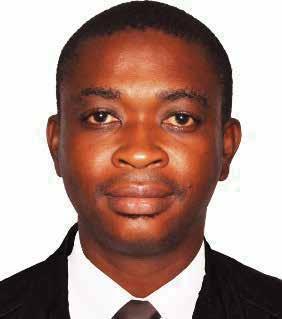
cially comforting ones that entice those looking for shortcuts, often mislead much more than enlighten. This was the case with the transitory in ation narrative that, while discredited in 2021-22, is now reemerging. It is also the case with those who are predicting with a high degree of condence a US recession (I am not in that camp), only to dismiss it as “short and shallow” in order to regain their economic comfort zone.
The Vocational Training Teams committee on behalf of Rotary International District 9102 to include Ghana, Togo, Benin and Niger recently launched two major projects – the Knowledge Bank and Vocational Service Projects ahead of its January vocational service month celebration.
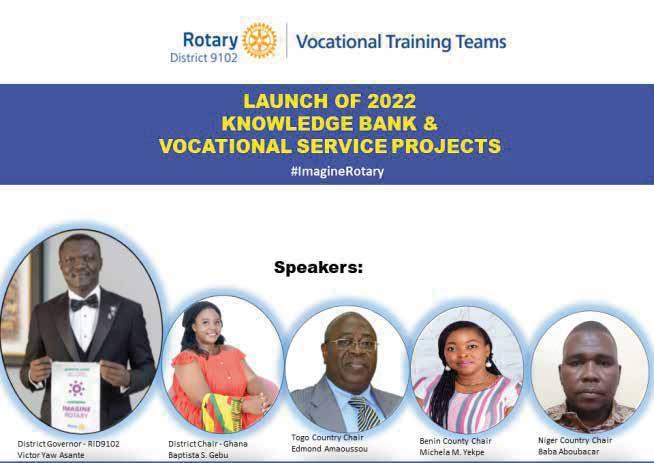
On behalf of the District Governor Victor Yaw Asante, the District Vocational Training Teams Chair together with its fellow Country Chairs and committee members for this Rotary year; encouraged partners in service to come deposit their competencies into the created virtual knowledge bank project and join in to celebrate the forgotten avenues of Service.
This project was launched virtually by the District Governor. Ahead of the launch, major stakeholder engagements were carried out with
several blocks to include the Council of President, Rotaractors, Francophone and Anglophone blocks. During January - the vocational service month, the committee took turns to support the district imagine rotary through vocational service.
The Chair, further called on all to imagine fearlessly a sustainable future using business and professional life as the foundation and vocational service a major force in promoting same. To Rotary International, the object of Vocational Service she said is to encourage and foster high ethical standards in business and professions; the recognition of the worthiness of all useful occupations; the dignifying by each Rotarian of his occupation as an opportunity to serve society.
This January - the committee encouraged all Rotarians, Rotaractors and Interactors to; pride themselves of being able to use their
professional stature and knowledge to make things happen in the district and in our communities.
As a district goal, all were encouraged and reminded of the need to visit the learning center today to continue learning in order to be part of the winning team. Rotary provides humanitarian service, promotes high ethical standards in all vocations, and helps build international understanding, goodwill and peace.
With our progressive attitude, all partners in service were called to do everything in their power to distinguish their profession and promote its highest ethical standards to improve the quality of life all in our community and district at large.
Partners in service were admonished this year to pause to re ect on the 4-way-test as we ask if;
By Baptista S. Gebu– “Of all the things we think, say or do:
1. If It is the TRUTH?
2. Is it FAIR to all concerned?
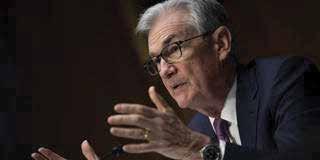
3. Will it build GOODWILL and BETTER FRIENDSHIPS?
4. Will it be BENEFICIAL to all concerned?”
Rotary is a global network of 1.4 million neighbors, friends, leaders, and problem-solvers who see a world where people unite and take action to create lasting change –across the globe, in our communities, and in ourselves. Solving real problems takes real commitment and vision. For more than 110 years, Rotary's people of action have used their passion, energy, and intelligence to take action on sustainable projects. From literacy and peace to water and health, Rotarians are always working to better our world, and stay committed to the end.
Knowledge holds the key to economic prosperity. Technology, innovation, and know-how all come from learning new ways to produce the goods and services that enrich us. Knowledge is also the archetypal “public good”: new ideas can bene t everyone; and unless governments or monopolies restrict their dissemination, usage does not diminish availability. This is especially important for poor countries, because it means that they do not have to reinvent the wheel. They can simply adopt technologies and methods created by richer countries to drive their own economic development.
While economists and policymakers have long appreciated the economic signi cance of knowledge, they have not paid su cient attention to the conditions that make it useful. Context matters: any mismatch between the conditions under which ideas are generated and the speci cities of the environment where they are applied can signicantly reduce the value of acquiring knowledge.
For example, corn is grown all over the world, but it is subject to di erent environmental threats, depending on the local ecology. Research and development e orts have naturally focused on developing resistance to pests that are most common in North America and Europe. As a result, thousands of biotech patents are geared toward the European corn worm, but only ve unique patents are for innovations protecting against the maize stalk borer, which predominantly a ects Sub-Saharan Africa.
Having studied these and many other examples, economists Jacob Moscona and Karthik Sastry of Harvard University argue that the inappropriateness of technologies developed in advanced economies can pose a signi cant obsta-

cle to agricultural-productivity growth in low-income areas. According to their analysis, the technology mismatch in crop-speci c pests and pathogens alone can account for 15% of the global disparity in agricultural productivity.
In a recent panel discussion organized by the International Economic Association, Moscona and other experts provided a wide range of illustrations of inappropriate technologies at work. Mireille Kamariza, a bioengineer at UCLA, described how the development of diagnostic technologies for tuberculosis and other infectious diseases that chie y a ect low-income countries has lagged far behind diagnostic technologies for rich-country diseases.
When COVID-19 hit rich countries, hundreds of diagnostic tests became available within months. By contrast, it took more than a century to achieve comparable progress with respect to tuberculosis. Moreover, advanced tuberculosis-diagnostics techniques still rely on trained technicians and a steady supply of electricity, which may not be available in low-income settings.
Mismatch can also occur within countries when technologies tailored to the interests of certain groups are deployed more widely. Automation and digital technologies, for example, can be inappropriate if they produce undesirable e ects for many workers.
As Anton Korinek of the University of Virginia notes, all innovations are double-edged: they can enhance productivity in the aggregate, but they can also generate sharp redistributive e ects favoring capital owners over workers. And when the overall productivity gains are not very large, they can easily be outweighed (from a
societal perspective) by the negative redistributive e ects – a phenomenon that economists Daron Acemoglu and Pascual Restrepo call “so-so” innovation. Robots provide the clearest example of this adverse shift against workers, and arti cial intelligence is expanding the range of domains where distributional con icts can become signi cant. As Korinek points out, chatbot software that replaces human workers enhances the returns to AI engineers and rm owners, while displacing workers with less than a college education. The impact is magni ed in developing countries where low-cost labor is the sole source of comparative advantage. Moreover, knowledge is embedded not only in seeds or software but also in cultural norms. At the same IEA panel, economist Nathan Nunn talked about a di erent, temporal kind of mismatch where knowledge and practices that were appropriate for a society at one time can later become dysfunctional. Cultural traditions pass on useful knowledge to future generations. Religious rituals, for example, can help to coordinate crop planting, and particular cooking techniques imparted by a family’s elders can protect against dietary toxins. But since cultural norms evolve slowly, rapid changes in society can produce an “evolutionary mismatch.”
Drawing on his work with Leonard Wantchekon, Nunn gives the example of Africa’s traumatic experience with transcontinental slavery. Communities in Africa that had the most extensive contact with slave traders developed a deep mistrust of outsiders, leaving them with a cultural
inclination that is counterproductive for developing a ourishing market economy in today’s world. Similarly, Americans’ aversion to redistribution appears to re ect the country’s high degree of economic mobility in the past, rather than current realities.
Whether they take the form of inappropriate technologies or cultural practices, such mismatches need to be addressed if knowledge is going to bene t a society. One strategy is consciousness raising. That is how the environmentalist movement helped steer consumer demand away from fossil fuels and mobilize support for the development of renewables. A similar “technology for workers” movement could redirect innovation in a more labor-friendly direction. Enhancing the voice of relevant stakeholders –such as workers or poor countries –in decisions about innovation and technology would guard against the adoption of inappropriate technologies.
Public policies are also critical. The Green Revolution in the twentieth century was motivated by the explicit recognition that enhancing agricultural productivity in low-income countries would require developing high-yield seed varieties suited to tropical environments. Though we lack a similar multilateral e ort to close global technology gaps today, Moscona points to several middle-income countries (India, Brazil, South Africa) that have the capacity to develop technologies more appropriate tf Silicon Valley, rather than local needs. Policymakers and innovators alike would do well to remember that it is not knowledge, but rather useful knowledge, that empowers us.
How do we drive investment to the transformed Africa with our master plan and blueprint for the continent?
Africa’s blueprint and master plan for transforming Africa begins with a prosperous Africa based on inclusive growth and sustainable development, where an integrated continent is politically united and based on the ideals of Pan-Africanism and the vision of Africa’s Renaissance. An Africa where good governance, democracy, respect for human rights, justice and the rule of law is observed and protected.
An Africa which is peaceful and secure with a strong cultural identity, common heritage, shared values and ethics, whose development is people-driven, relying on the potential of the African people, especially its women and youth, and caring for children. An Africa which is strong, united, resilient and in uential with global players and partners is the ideal Africa we want.
The blueprint and master plan for transforming Africa must consider and work towards an Africa which has an integrated high speed train network with an African commodities strategy which has established a functioning African Continental Free Trade Area (AfCFTA) operating an African passport where free movement of people is enabled. The Africa we want must silence the guns, be able to implement the grand INGA Dam project and establish a single African air-transport market, an annual African Economic Forum, an African nancial institution, the Pan –African e-network, the Africa outer space strategy, an African virtual and E-University be able to put in place a cyber-security, great African museum as well as an encyclopedia about the continent.
The Africa we want is possible and attainable we need a change mindset to accept this reality as we pull in investment. I want to encourage you to see the glass as half full and not half empty as an expression of optimism. I envision the Africa we want is possible when we know about it, work towards it and build it together! It’s the power of choice. Let’s emancipate ourselves from mental slavery and accept the grass is greener here. We need that change mindset rst.
The outside media portals Africa as poverty stricken and needy; which is far from the ideal truth, a situation which will not pull in the right investment. Africa must tell the African story the Africa way. The ideal Africa we want must not wait for other continents to tell its perceived story
misconstrue from the idea reality. Africa is not a country but a continent and civilization began in Africa.
The current population of Africa is 1,416,097,444 as of November 9, 2022, based on the latest United Nations estimates. The Africa we want must invest into its own research. Most often than not, one is tempted to quote other sources due to non-availability and in some cases lack of relevant data. The narrative is changing and its welcome news. Ko Annan is quoted to have said; “Knowledge is power. Information is liberating. Education is the premise of progress, in every society, in every family”. Let’s then know and understand the Africa we want in the Agenda 2063 blueprint.
The world’s populations reached 8 billion on November 15, 2012 according to the latest United Nations estimates and revisions from the UN, Department of Economic and Social A airs, Population Division, released in 2022. It is projected to reach 9 billion in 2037, and 10 billion people in the year 2058. It is said to have doubled in 40 years from 1959 when we were 3 billion people to 1999 when we were 6 billion. We are currently (2022) growing at a rate of around 0.84 % per year, adding 67 million people per year to the total according to 2022 estimates from the United Nations.
According to The Organization of African Unity (OAU), the precursor of the African Union; the Africa we want must encompass these.
“AGENDA 2063 is Africa’s blueprint and master plan for transforming Africa into the global powerhouse of the future. It is the continent’s strategic framework that aims to deliver on its goal for inclusive and
sustainable development and is a concrete manifestation of the pan-African drive for unity, self-determination, freedom, progress and collective prosperity pursued under Pan-Africanism and African Renaissance The genesis of Agenda 2063 was the realization by African leaders that there was a need to refocus and reprioritize Africa’s agenda from the struggle against apartheid and the attainment of political independence for the continent which had been the focus of The Organization of African Unity (OAU), the precursor of the African Union; and instead to prioritize inclusive social and economic development, continental and regional integration, democratic governance and peace and security amongst other issues aimed at repositioning Africa to becoming a dominant player in the global arena.
As an a rmation of their commitment to support Africa’s new path for attaining inclusive and sustainable economic growth and development, African heads of state and government signed the 50th Anniversary Solemn Declaration during the Golden Jubilee celebrations of the formation of the OAU /AU in May 2013.
The declaration marked the re-dedication of Africa towards the attainment of the Pan African Vision of an integrated, prosperous and peaceful Africa, driven by its own citizens, representing a dynamic force in the international arena and Agenda 2063 is the concrete manifestation of how the continent intends to achieve this vision within a 50 year period from 2013 to 2063 thinking of the Africa of the future.
The need to envision a long-term 50 year development trajectory for Africa is important as Africa needs to revise and adapt its development agenda due to ongoing structural transformations; increased peace and reduction in the number of con icts; renewed economic growth and social progress; the need for people centered development, gender equality and youth empowerment; changing global contexts such as increased globalization and the ICT revolution; the increased unity of Africa which makes it a global power to be reckoned with and capable of rallying support around its own common agenda; and emerging development and investment opportunities in areas such as agri-business, infrastructure development, health and education as well as the value addition in African commodities.
Agenda 2063 encapsulates not only Africa’s aspirations for the future but also identi es key agship programmes which can boost Africa’s economic growth and development and lead to the rapid transformation of the continent.
Agenda 2063 also identi es key activities to be undertaken in its 10 year implementation plans which will ensure that Agenda 2063 delivers both quantitative and qualitative transformational outcomes for the African people.
Africa’s Seven (7) Aspirations for the Future.
Agenda 2063 seeks to deliver on a set of seven aspirations each with its own set of goals which if achieved will move Africa closer to achieving its vision for the year 2063. These 7 aspirations re ect our desire for shared prosperity and well-being, for unity and integration, for a continent of free citizens and expanded horizons, where the full potential of women and youth are realized, and with freedom from fear, disease and want.
Aspiration 1: A prosperous Africa based on inclusive growth and sustainable development.

Aspiration 2: An integrated continent politically united and based on the ideals of Pan-Africanism and the vision of Africa’s Renaissance.
Aspiration 3: An Africa of good governance, democracy, respect for human rights, justice and the rule of law.
Aspiration 4: A peaceful and secure Africa.
Aspiration 5: An Africa with a strong cultural identity, common
heritage, shared values and ethics.
Aspiration 6: An Africa, whose development is people-driven, relying on the potential of African people, especially its women and youth, and caring for children.
Aspiration 7: Africa as a strong, united, resilient and in uential global player and partner.
The Fifteen (15) Flagship Projects of Agenda 2063
The agship projects of Agenda 2063 refers to key programmes and initiatives which have been identi ed as key to accelerating Africa’s economic growth and development as well as promoting our common identity by celebrating our history and our vibrant culture. The agship projects encompass infrastructure, education, science, technology, arts and culture as well as initiatives to secure peace on the continent. It includes;
1.Integrated High Speed Train Network.
2.Formation of an African Commodities strategy.
3.Establishment of the African Continental Free Trade Area (AfCFTA).
4.The African Passport and Free Movement of People.
5.Silence the Guns by year 2020.
6.Implementation of the grand INGA Dam project
7.Establishment of a single African Air-Transport Market (SAATM)
8.Establishment of an annual African Economic Forum
9.Establishment of the African Financial Institutions
10.The Pan – African E-Network

11.Africa outer space strategy
12.An African virtual and E-University
13.Cyber security
14.Great African Museum
15.Encyclopedia Africana
The Establishment of the African Continental Free Trade Area (AfCFTA). According to information available from the AfCFTA Secretariat, AfCFTA is the largest free trade area in the world measured by the number of countries participation with a combined gross domestic product of $3.4 Trillion as it connects 1.3 billion people now 1.4 billion across the 56 countries. As at December 2022 54 out of the 55 member states of the AU have signed the AfCFTA agreement. 44 African countries have deposited their instrument of rati cation with the African Union commission. The interesting bit of the discuss is that, AfCFTA has the potential to lift 30 million people from extreme poverty as its expected to boost Africa’s income by some $450 billion by the year 2035 representing a 7% gain.
The creation of this single market for goods and services will allow African countries to trade amongst themselves duty-free and quota-free. The agreement to establish this AfCFTA was signed far back in March 2018 in Rwanda on the 21st day in Kigali however trading o cially commenced on January 1, 2021 two years down the line. And commer-
cially meaningful trading o cially also started in October, 2022 exactly on the 7the day of the month.
The creation of this one single market for goods and services will facilitate the movement of people in a bid to deepen the economic integration of the African continent. As an objective, this ideal prosperous Africa must promote its development to be people-driven this it can achieve by creating a free market for goods and service where the possibility of successive rounds and negotiations are possible. When AfCFTA is people driven, this will contribute to the movement of capital and natural persons which will facilitate investments building in party states. A people driven Africa must promote as an objective an industrial development achieved through diversi cation and regional value chain development, agricultural development and food security amongst others.
When its people drive, it will create and increase employment for the people of each African country, enable the citizens to take advantage of economies of scale and become more competitive. It will also support the countries to enjoy a better terms of trade whiles promoting favourable market access to the largest one single market.
To become a member, African countries are expected to sign the agreement and deposit their instruments of rati cation with the African Union Commission. Ghana is currently a
state party to AfCFTA since May 2018.
To export under this trade arrangement, there are some conditions to be met. One, one must comply with the AfCFTA rules of origin and goods must be in the liberalized tari schedule of the destination country, amongst other additional procedures to be looked at in subsequent editions.
“It is clear that we must nd an African solution to our problems, and that this can only be found in African unity. Divided we are weak; united, Africa could become one of the greatest forces for good in the world”. The Africa we want is possible. Let’s face neither east nor west but face forward. “I am not African because I was born in Africa but because Africa was born in me – Dr. Osagyefo Dr Kwame Nkrumah”
Baptista is the author of the book: Prepare for the Future of Work and the CEO of FoReal HR Services in Ghana. As a Hybrid professional, building a team of e cient & e ective workforce is her business. A ecting lives is her calling! She is a Public and Keynote Conference Speaker, a Professional Connector and a Researcher. You can reach her via e-mail on bap.tista@outlook.com Follow her social media pages and the hashtag #theFutureofWorkCapsules #FoWC #forealhrservices

“It is clear that we must nd an African solution to our problems, and that this can only be found in African unity. Divided we are weak; united, Africa could become one of the greatest forces for good in the world”. –
Osagyefo Dr. Kwame NkrumahAfrica’s blueprint and master plan for transforming Africa begins with a prosperous Africa based on inclusive growth and sustainable development, where an integrated continent is politically united and based on the ideals of Pan-Africanism and the vision of Africa’s Renaissance. An Africa where good governance, democracy, respect for human rights, justice and the rule of law is observed and protected.
An Africa which is peaceful and secure with a strong cultural identity, common heritage, shared values and ethics, whose development is people-driven, relying on the potential of the African people, especially its women and youth, and caring for children. An Africa which is strong, united, resilient and in uential with global players and partners is the ideal Africa we want.
The blueprint and master plan for transforming Africa must consider and work towards an Africa which has an integrated high speed train network with an African commodities strategy which has established a functioning African Continental Free Trade Area (AfCFTA) operating an African passport where free movement of people is enabled. The Africa we want must silence the guns, be able to implement the grand INGA Dam project and establish a single African air-transport market, an annual African Economic Forum, an African nancial institution, the Pan – African e-network, the Africa outer space strategy, an African virtual and E-University be able to put in place a cyber-security, great African museum as well as an encyclopedia about the continent.
The world’s populations reached 8 billion on November 15, 2012 according to the latest United Nations estimates and revisions from the UN, Department of Economic and Social A airs, Population Division, released in 2022. It is projected to reach 9 billion in 2037, and 10 billion people in the year 2058. It is said to have doubled in 40 years from 1959 when we were 3 billion people to 1999 when we were 6 billion. We are currently (2022) growing at a rate of around 0.84 % per year, adding 67 million people per year to the total according to 2022 estimates from the United Nations.
Africa is not a country but a continent and civilization began in Africa.
By Baptista S. H. Gebu (Mrs.)The population of Africa is now around 1,416,097,444 (1.4 billion) as of November 2022, based on the United Nations estimates. Let’s then know and understand the Africa we want in the Agenda 2063 blueprint. I serve you the Africa we want blueprint including its 7 aspirations and 15 agship projects focusing on one of the agships projects of Agenda 2063.

According to The Organization of African Unity (OAU), “AGENDA 2063 is Africa’s blueprint and master plan for transforming Africa into the global powerhouse of the future. It is the continent’s strategic framework that aims to deliver on its goal for inclusive and sustainable development and is a concrete manifestation of the pan-African drive for unity, self-determination, freedom, progress and collective prosperity pursued under Pan-Africanism and African Renaissance.
As an a rmation of their commitment to support Africa’s new path for attaining inclusive and sustainable economic growth and development, African heads of state and government signed the 50th Anniversary Solemn Declaration during the Golden Jubilee celebrations of the formation of the OAU /AU in May 2013.
The declaration marked the re-dedication of Africa towards the attainment of the Pan African Vision of an integrated, prosperous and peaceful Africa, driven by its own citizens, representing a dynamic force in the international arena and Agenda 2063 is the concrete manifestation of how the continent intends to achieve this vision within a 50 year period from 2013 to 2063 thinking of the Africa of the future. Agenda 2063 encapsulates not only Africa’s aspirations for the future but also identi es key agship programmes which can boost Africa’s economic growth and development and lead to the rapid transformation of the continent. Agenda 2063 also identies key activities to be undertaken in its 10 year implementation plans which will ensure that Agenda 2063 delivers both quantitative and qualitative transformational outcomes for the African people.
Agenda 2063 seeks to deliver on a set of seven aspirations each with its own set of goals which if achieved will move Africa closer to achieving its vision for the year 2063. These 7 aspirations re ect our desire for shared prosperity and well-being, for unity and integration, for a continent of free citizens and expanded horizons, where the full potential of women and youth are realized, and with freedom from fear, disease and want.
The agship projects of Agenda 2063 refers to key programmes and initiatives which have been identied as key to accelerating Africa’s economic growth and development as well as promoting our common identity by celebrating our history and our vibrant culture. The agship projects encompass infrastructure, education, science, technology, arts and culture as well as initiatives to secure peace on the continent.
According to information available from the AfCFTA Secretariat, AfCFTA is the largest free trade area in the world measured by the number of countries participation with a combined gross domestic product of $3.4 Trillion as it connects 1.3 billion people now 1.4 billion across the 56 countries. As at December 2022 54 out of the 55 member states of the AU have signed the AfCFTA agreement. 44 African countries have deposited their instrument of rati cation with the African Union commission. The interesting bit of the discuss is that, AfCFTA has the potential to lift 30 million people from extreme poverty as its expected to boost Africa’s income by some $450 billion by the year 2035 representing a 7% gain.
The creation of this single market for goods and services will allow African countries to trade amongst themselves duty-free and quota-free. The agreement to establish this AfCFTA was signed far back in March 2018 in Rwanda on the 21st day in Kigali however trading o cially commenced on January 1, 2021 two years down the line. And commercially meaningful trading o cially also started in October, 2022 exactly on the 7the day of the month.
The creation of this one single market for goods and services will facilitate the movement of people in a bid to deepen the economic integration of the African continent. As an objective, this ideal prosperous Africa must promote its development to be people-driven this it can achieve by creating a free market for goods and service where the possibility of successive rounds and negotiations are possible. When AfCFTA is people driven, this will contribute to the movement of capital and natural persons which will facilitate investments building in party states. A people driven Africa must promote as an objective an industrial development achieved through diversi cation and regional value chain development, agricultural development and food security amongst others.
When its people drive, it will create and increase employment for the people of each African country,
enable the citizens to take advantage of economies of scale and become more competitive. It will also support the countries to enjoy a better terms of trade whiles promoting favourable market access to the largest one single market.
To become a member, African countries are expected to sign the agreement and deposit their instruments of rati cation with the African Union Commission. Ghana is currently a state party to AfCFTA since May 2018.
To export under this trade arrangement, there are some conditions to be met. One, one must comply with the AfCFTA rules of origin and goods must be in the liberalized tari schedule of the destination country, amongst other additional procedures to be looked at in subsequent editions.
The Africa we want is possible. Let’s face neither east nor west but face forward. “I am not African because I was born in Africa but because Africa was born in me – Dr. Osagyefo Dr Kwame Nkrumah”
Baptista conference speaker, a Hybrid Professional and the Executive Director of ProHumane Afrique International, a charitable, development & think thank organization working with communities & individuals to create sustainable solutions to transform communities through diverse pro-poor initiatives. Follow this conversation on our social media sites: Linked-In/ Twitter/ Facebook/ Instagram: ProHumane Afrique International. Hashtag: #behumane #thegivingcapsules #prohumaneafriqueint #fowc

ENDING - FEBRUARY 3, 2023
ENDING - FEBRUARY 3, 2023







ENDING - FEBRUARY 3, 2023
ENDING - FEBRUARY 3, 2023




Weekly Outlook and Review
31%
Read
Naira note chaos in election run-up
Two weeks before Nigeria’s election, a scarcity of cash and fuel is stoking chaos in the country. After clashes at empty ATMs and accusations of banks hoarding new Naira bills, the Supreme Court on Wednesday suspended the central bank’s second deadline to end the use of old bank notes. Meanwhile, Africa’s biggest oil exporting nation continues to struggle with severe petrol shortages, with retailers unwilling accept old Naira notes and to sell at official subsidized rates. Amidst concern that cash and fuel shortages will prevent the mobilisation and payment of officials by the Electoral Commission of Nigeria, its Chairman Mahmood Yakubu said on Wednesday that polling will go ahead as scheduled on Feb. 25 and that the Commission is working with the national oil company and the central bank to assure supplies. Turnout to the polling stations could prove the deciding factor, with a Stears poll this week putting Labour’s Peter Obi as favourite in the event of high voter turnout and the ruling APC’s Bola Tinubu given a low turnout. For the currency markets, the lack of physical cash has held the Naira stable against the dollar this week, trading at 747 from 748 at last week’s close. We expect renewed Naira weakness once the new notes are fully circulating and business returns to normal.


Alex Barmuta Forex Dealer, AZA Finance





Murega
Trading Desk Manager, AZA FinanceThe Cedi appreciated against the dollar, trading at 12.05 from 12.25 at last week’s close as FX demand eased. The Bank of Ghana sold only $9.2m of dollars in the spot market last week, compared to $40m at the previous Jan. 30 sale. Ghana is sweetening its debt swap offer to encourage participation of local pension funds, which would under the latest plan receive their full interest payments but over a longer time horizon. Other bondholders will receive lower interest payments as part of the debt swap. Ghana is also expected to convert around GHS40bn of loans it owes to the central bank into bonds as part of the broader restructuring plan to unlock a $3bn IMF bailout. As the country continues to advance with its restructuring efforts, we expect the Cedi to appreciate in the near term.
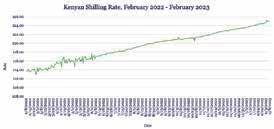
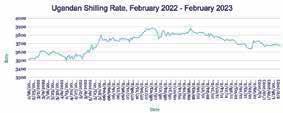
Yadhav Panday

Foreign Exchange Down
10%
The Pound weakened against the dollar, trading at 30.43 from 30.28 at last week’s close, continuing its slide towards its record low 30.50 hit in early January. Moody’s Investors Service cut Egypt’s credit rating one notch to B3, six levels below investment grade, citing reduced ability to deal with external macroeconomic shocks while the economy undergoes a structural adjustment towards private sector and export-led growth. Companies face deteriorating conditions as output prices rise at their fastest pace in six years and purchase cost-inflation is the highest in more than four years. We expect the Pound to continue depreciating until structural reforms start to take effect.
Kenya Shilling at new low while deficit narrows
The Shilling slipped to a fresh low against the dollar, trading at 124.92 from 124.62 at last week’s close amid sustained pressure from importers to meet their obligations and broader dollar strengthening. Shortages of foreign currency in Kenya have continued to weigh on business growth in the country. Despite such strains, the current account deficit was lower than forecast last year, coming in at 4.9% of GDP compared to 5.4% in 2021 on the back of increased exports and diaspora remittances towards the end of the year. The central bank had expected the deficit to hit 5.6% in 2022. With dollar demand continuing to outweigh supply, we expect the Shilling to remain under pressure in the coming days.

On Saturday 4th February 2023, Management of Lycee Francais International Jacques Prévert, held this year’s edition of the school’s annual Career Day event at the school’s premises, located at East Legon, in Accra.
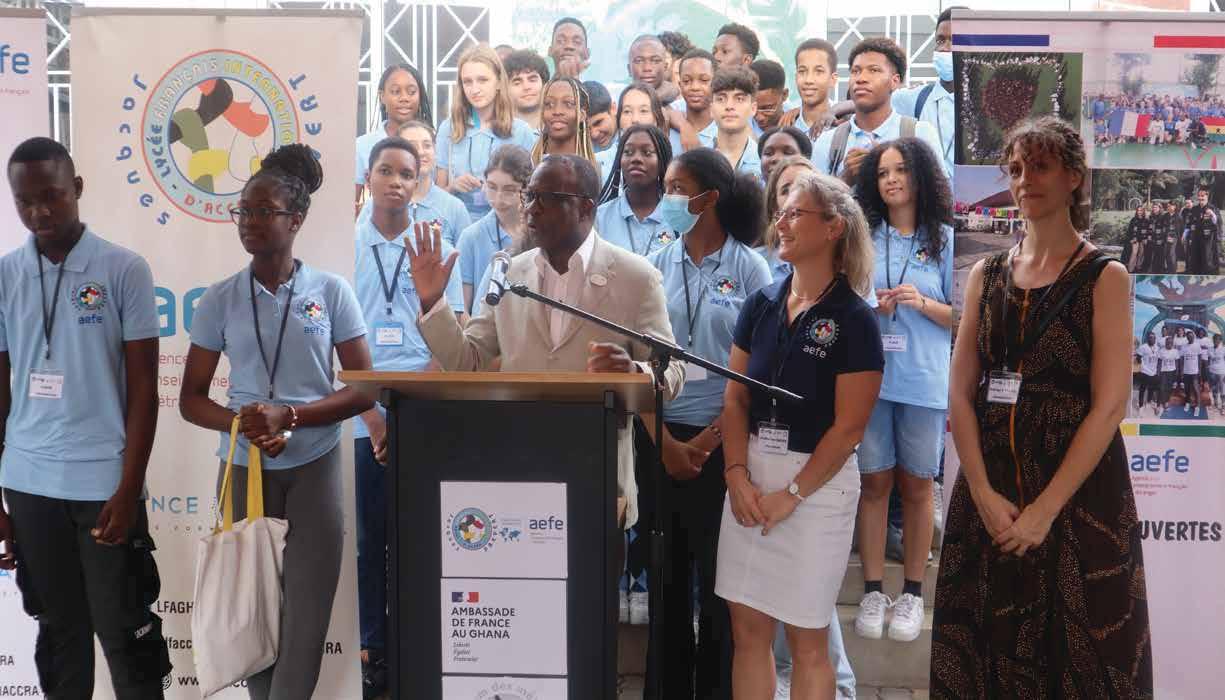

The event is organised by the Management of the school, one of the leading educational institutions in Ghana providing quality education, to create an opportunity for students to get a deeper understanding of various professions.
Students from Grade 9 to 12 had the opportunity to have conversations with renowned professionals on the motivation for selecting their careers, challenges they face and the things that sustained them at the top of their careers.
The French Ambassador to Ghana, His Excellency Jules Armand Aniambossou was the Special Guest for the event and participated in the engagement with the students in the area of Diplomacy and International Corporation.
Professor Raymond A. Atuguba, Dean of the University Of Ghana School Of Law, Ms. Kadidjah Amoah, Chief Executive O cer of Aker Energy, Mr. Scott Coles, Co ee Business Executive O cer for Nestlé Central and West Africa, Mr. Nadim Ghanem, Managing Director of Miniplast were part of the resource persons at the event. Others were Mr. Hamidou SORGO, Senior Operations O cer, at International Finance Corporation, Mr. Jonathan Christopher Koney, Assis-
tant Manager, Corporate A airs & International Cooperation, Ghana EXIM Bank, Ms. Anita Erskine, Media Entrepreneur and Communications Specialist and Ms. Lara Naim Laham, HR Consultant & Accredited Executive and Leadership Coach.
Speaking after the event, H, E Jules Armand Aniambossou expressed his excitement about the event, especially the interest from the students to know more about what the resource persons do and their brilliant questions. He further called on people in authority to empower women to take leadership roles and encourage them to make a conscious e ort to learn French to open them up to more opportunities.
On her part, the Principal of the school, Ms. Catherine DAUER said,
“the Career Day is an important event on our calendar because it exposes the students to a variety of careers and jobs as well as connecting the students to professionals in those elds to give them account of what the real work is all about. This goes a long way to help the students to make some vital decisions with regards to their careers”.
At the event, Management of the school announced Saturday 11th February 2023 as the date for this year’s edition of its annual Open Day event, a day set aside to host members of the public in the school to have rst-hand information on the operations of the school as well as giving them a deeper insight into the school’s academic structure and processes.